2017_2018年八年级英语上册语法连词讲义(新版)人教新目标版
2018新人教版八年级上册英语单元语法及知识点归纳.docx

2018新人教版八年上册英元法及知点Unit1 Where did you go on vacation?【重点法】不定代:不指名代替任何特定名或形容的代叫做不定代。
用法注意:1. some和any +可数名/不可数名。
some 多用于肯定句,any 多用于否定句、疑句和条件从句。
有些句中用 some, 不用 any, 者希望得到方肯定回答。
2.由some, any, no, every与body, one, thing构成的复合不定代作主,其用三。
3.不定代若有定修,定要置于其后:如:something interesting【重点短】1. buy sth for ab./ buy sb. sth某人某物2.taste + adj.起来⋯⋯3.nothing...but + V.(原形)除了⋯⋯之外什么都没有4. seem + (to be) + adj看起来5. arrive in +大地方/ arrive at +小地方到达某地6. decide to do sth.决定做某事7. try doing sth.做某事/ try to do sth.尽力做某事8. enjoy doing sth.喜做某事9. want to do sth.想去做某事10. start doing sth.开始做某事=begin doing sth.11. stop doing sth.停止做某事区分:stop to do sth.停下来去做某事12. dislike doing sth.不喜做某事14. so + adj + that +从句如此⋯⋯以至于⋯⋯16. tell sb. (not) to do sth.告某人(不要)做某事17. keep doing sth.做某事18. forget to do sth.忘去做某事 / forget doing sth忘做某事【辨析】1. take a photo/ take photos拍照quite a few+名复数“ 多⋯”2. seem +形容看起来⋯...You seem happy today. seem + to do sth.似乎 / 好像做某事 I seem to have a coldIt seems +从句似乎 .. ⋯It.seems that no one believe you.seem like ...好像,似乎⋯ It.. seems like a good idea.3. arrive in +大地点 = get to= reach+地点名“到达 ......”arrive at +小地点(注:若后跟地点副 here/there/home,介需省略,如: arrive here; get home)4. feel like sth感像⋯feel doing sth.想要做某事5. wonder(想知道) + 疑( who, what, why)引的从句。
人教新目标英语八年级上册Unit1单元知识点讲义

人教新目标英语八年级上册Unit 1 单元知识点讲义1.复合不定代词:指人: someone anyone no one everyone某人某人,任何人没有人每人somebody anybody nobody everybody指物:something anything nothing everything某物某物,任何事物没有东西每件事物1) 复合不定代词做主语,谓语动词用单三.Ex. Someone is waiting for you at the door.Nobody knows the answer to the question .2) some…一般用于肯定句中,any…一般用于否定句和疑问句中.Ex. There is something in the room .There isn’t anything in the room .Is there anything in the room ?I have something to do today .I don’t have anything to do today .There is someone outside the door .There isn’t anyone outside the door.Is there anyone outside the door ?3) 在表示邀请,请求,建议希望得到对方肯定回答时,用some… , 不用any…Would you like something to drink / eat ?4) 肯定句中anything 表示任何事物, anyone = anybody 任何人Ex. Anything is OK.I can do anything for you .Anybody knows the answer.5) 形容词或to do 形式修饰复合不定代词时要后置.Ex. There is nothing wrong with my car.I have something important to tell you .There isn’t anything interesting here .Do you want something to drink / eat ?6) not everybody / everyone / everything 表示部分否定,意为‘并非都…’Ex. Not everyone likes singing .Not everything goes well .not any …和no…表示全部否定Ex. He listened ,but heard nothing .He listened ,but didn’t hear anything .not anything = nothing not anyone/ body = no one / nobodyEx. There is nothing in the bottle . = There isn’t anything in the bottle.7) no one 指人,回答Who 提问, no one of … / nobody 不能加ofnothing 指物, 不能加of none 指人或物,回答Is there …? 提问none of …Ex. Who is in the room ? No one .Is there anyone in the room ? None .2.表地点复合不定副词:somewhere anywhere某地,肯定句中某地,否定句和疑问句中/ 任何地方,肯定句中nowhere everywhere没有地方到处,每个地方, 用于肯定句中Ex. I want to go somewhere interesting .3.wonderful adj. 精彩的Ex. We had a wonderful time on the beach .It is such a wonderful film that we all enjoy it .who…wonder v. 想知道what…引导的宾语从句,用陈述句语序why…Ex. I wonder who the boy is . = I want to know who the boy is .I wonder what they are doing . =I want to know what they are doing .wonder +特殊疑问词+ to doEx. I wonder what to do . = I want to know what to do . = I wonder what I should do.I wonder where to go . / I wonder how to do that .4、几乎没有few 后接可数名词复数(否)little 后接不可数名词肯 a few 有一些,后加可数名词复数quite a few 相当多,不少a little 有点,后加不可数名词quite a little相当多,不少only a few 只有一点only a littlevery few 非常少very littleEx. I have a few friends. 肯I have few friends . 否I have quite a few friends .a little 修饰adj. = kind of= a little bit5. most of the time 大部分时间most of the foodmost of us/themmost of + n. = most +n.Ex. Most of the students like English . = Most students like English .6. Of course . = Sure. = Certainly . 当然.7. 反身代词第一人称:myself ourselves 我们自己第二人称:yourself 你自己yourselves 你们自己第三人称:himself 他自己herself 她自己itself 它自己themselves 他们自己8. seem 似乎,好像1) seem to be +形容词/名词= seem + 形容词/名词似乎…Ex. That seems to be her mother . = That seems her mother .It seems to be too difficult . = It seems too difficult.2) seem to do sthHe seems to have a cold.3) It seems that + 从句.It seems that he is happy. = He seems to be happy . = He seems happy.9. adj. bored 感到无聊的修饰人boring 令人厌烦的修饰事或物I feel bored , because the movie is boring.be bored with …对…感到无聊Ex. I’m bored with the boring movie.10. keep / write a diary = keep /write diaries 记日记(keep优先使用)11. activity n. 活动activities 复数Ex. What activities did you find interesting ?12. decide 决定1) decide to do sth. 决定做某事= make a decision to do sth = make one’s mind doing sthThey decide to visit the museum.decide not to do sth 决定不要做某事decide + 疑问词+动词不定式He can not decide when to leave.2) decide + 宾语从句(陈述句语序)He can’t decide when he leaves .I can’t decide where I should go. 改为同义句I can’t decide where to go.13. try to do sth. 努力尽力去做某事Ex. You must try to pass the exam.try doing sth. 试着做某事Ex. He tried making a model plane.try one’s best to do sth = do one’s best to do sth 尽最大努力做某事Ex. You should try your best to learn English well .have a try 试一试try on 试穿Ex. Let me have a try .14. feel like1)给……的感觉,后接从句He feels like he is swimming.I felt like I was a bird.2) feel like 想要后接名词/代词/doing sthfeel like doing sth = want to do sth =would like to do sth想要做某事Do you feel like taking a walk with me ?Do you want to take a walk with me ?3) feel + 形容词, 感到…I feel bored .look +adj. sound+adj. feel +adj.look like +n. sound like+n. feel like +n.15.look 看起来taste 尝起来be( was were is am are)sound 听起来feel 感觉摸起来系动词+adj.smell 闻起来seem 似乎16. build v. 建筑n. 体格of medium build 中等身材building n. 建筑物,大楼builder n. 建筑师16.difference n. 不同点-----differences n. 复数different adj. 不同的be different from …不同于… = not the same as…Ex. 1) Chinese names are different from English names. = Chinese names aren’t the same as English names .2) I’m different from you . = I’m not the same as you .3) I can’t see the differences between the buses in the picture.n. 不同之处17. on the top of the hill在山顶, 面at the top of the hill 在山顶, 点(最高点)at the foot of the hill在山脚下walk up to the hill top 径直走向山顶come top 登顶,得第一Ex. He always comes top every exam.18. wait for + 人或物wait 不及物动词,连接forEx. I’ll wait for you at the door.He waited over an hour for the train . ( He waited for the train over an hour. )can’t wait to do sth 迫不及待做某事Ex. The wonderful vacation , I can’t wait .19. because + 从句because of + n./ pron./ doingBecause the weather was bad, we couldn’t see anything below.Because of the bad weather, we could n’t see anything below.20. enough 1) adj足够的,修饰名词做定语We have enough time to do our homework.I have enough money .2) adv.足够地,充分地,用来修饰形容词或副词,一般置于被修饰词之后I know him well enough.我足够了解他。
人教版新目标八年级英语上册Unit 2讲义及重点总结
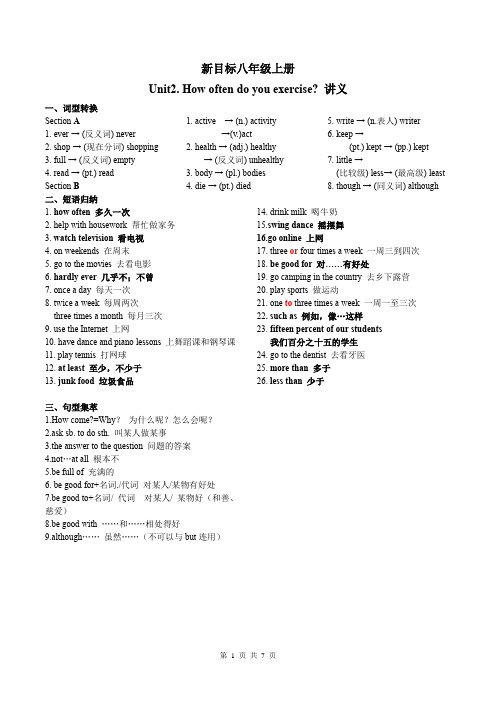
新目标八年级上册Unit2. How often do you exercise? 讲义一、词型转换Section A1. ever → (反义词) never2. shop → (现在分词) shopping3. full → (反义词) empty4. read → (pt.) readSection B 1. active → (n.) activity→(v.)act2. health → (adj.) healthy→ (反义词) unhealthy3. body → (pl.) bodies4. die → (pt.) died5. write → (n.表人) writer6. keep →(pt.) kept → (pp.) kept7. little →(比较级) less→ (最高级) least8. though → (同义词) although二、短语归纳1. how often 多久一次2. help with housework 帮忙做家务3. watch television 看电视4. on weekends 在周末5. go to the movies 去看电影6. hardly ever 几乎不;不曾7. once a day 每天一次8. twice a week 每周两次three times a month 每月三次9. use the Internet 上网10. have dance and piano lessons 上舞蹈课和钢琴课11. play tennis 打网球12. at least 至少,不少于13. junk food 垃圾食品14. drink milk 喝牛奶15.swing dance 摇摆舞16.go online 上网17. three or four times a week 一周三到四次18. be good for 对……有好处19. go camping in the country 去乡下露营20. play sports 做运动21. one to three times a week 一周一至三次22. such as 例如,像…这样23. fifteen percent of our students我们百分之十五的学生24. go to the dentist 去看牙医25. more than 多于26. less than 少于三、句型集萃1.How come?=Why?为什么呢?怎么会呢?2.ask sb. to do sth. 叫某人做某事3.the answer to the question 问题的答案4.not…at all 根本不5.be full of 充满的6. be good for+名词./代词对某人/某物有好处7.be good to+名词/ 代词对某人/ 某物好(和善、慈爱)8.be good with ……和……相处得好9.although……虽然……(不可以与but连用)四、难点讲练1.How often do you exercise?你多久锻炼一次?(1)how often表示“多久一次”。
人教版八年级英语上册语法单词讲义
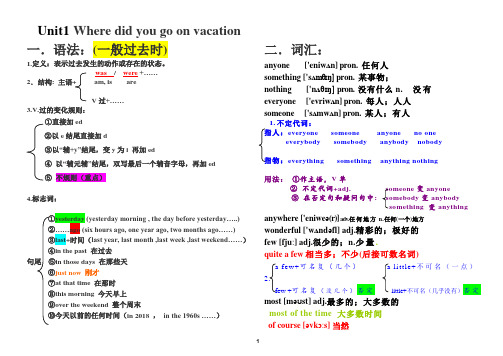
Unit1 Where did you go on vacation 一.语法:(一般过去时)1.定义:表示过去发生的动作或存在的状态。
was / were +…… 2.结构: 主语+ am, is areV 过+…… 3.V.过的变化规则: ①直接加ed②以e 结尾直接加d③以“辅+y”结尾,变y 为i 再加ed④ 以“辅元辅”结尾,双写最后一个辅音字母,再加ed ⑤ 不规则(重点)4.标志词:①yesterday (yesterday morning , the day before yesterday…..) ②……ago (six hours ago, one year ago, two months ago……) ③last+时间(last year, last month ,last week ,last weekend……) ④in the past 在过去 句尾 ⑤in those days 在那些天⑥just now 刚才⑦at that time 在那时 ⑧this morning 今天早上 ⑨over the weekend 整个周末⑩今天以前的任何时间(in 2018 , in the 1960s ……)二.词汇:anyone ['eniw ʌn] pron. 任何人 something ['s ʌm θɪŋ] pron. 某事物;nothing ['n ʌθɪŋ] pron. 没有什么n. 没有 everyone ['evriw ʌn] pron. 每人;人人 someone ['s ʌm w ʌn] pron. 某人;有人1. 不定代词:指人:everyone someone anyone no one everybody somebody anybody nobody指物:everything something anything nothing用法: ①作主语,V 单② 不定代词+adj. someone 变anyone③ 在否定句和疑问句中: somebody 变anybodysomething 变anythinganywhere ['eniwe ə(r)] adv.任何地方n.任何(一个)地方dislike doing sth.(不喜欢干某事)have a good time=enjoy oneself=have fun玩得痛快Central Park 中央公园Tian'anmen square 天安门广场the Palace Museum 故宫博物院Unit2 How often do you exercise?一.语法:(频度副词和次数的表达)(一).频度副词always > usually > often>sometimes > seldom > hardly ever > nevershare [ʃe ə(r)] vt.分享,共享;分配;共有14. share sth. with sb. 和某人分享某物share in sth. 共同分担某事similar ['s ɪm əl ə(r)] adj. 类似的 be similar to 类似于;与...相似primary ['pra ɪm əri] adj.最初的,最早的information [ˌɪnf ə'me ɪʃn] n.信息;情报;资料;通知16. information 不可名Unit4 What's the best movie theater? 一. 语法:(adj.&adv.最高级)1.定义:表示三者或以上同类事物之间的比较 ①主+谓+the+最高级+范围②主+谓+比+than+any other+名单+范围 2.结构 ③One of +the +形高名复 is……④ the +序数词+形高名单 is ……⑤主+谓+the +最高级+名词+I have ever ……theater ['θɪətə] n.剧场;电影院;戏院comfortable ['kʌmftəbl] adj.舒适的;充裕的comfortably ['kʌmftəbli] a d v.舒服地;容易地;充裕地seat [siːt] n.座位;1.have a seat =sit down 坐下sit v.坐(sat)screen [skriːn] n.屏幕;银幕close [kləs]v.关;合拢;不开放;停业2.be close to …… 离……近close v.关☞→ open v. 打开ticket n.票worse [wɜːs] adj.更坏的;更差的worst [wɜːst] adj.最坏的;最差的cheaply ['tʃiːpli] adv.廉价地;粗俗地3. cheap adj.便宜的☞→ expensive/dear adj.昂贵的song [sɒŋ] n.歌曲;歌唱choose [tʃuːz]v.选择;决定5.choose-chose-chosencarefully ['keəfəli] adv.小心地,认真地6.careful adj. ☞→ carefully adv.careless adj. ☞→ carelessly adv. 粗心地reporter [rɪ'pɔːtə(r)] n.记者so far到目前为止;迄今为止fresh [freʃ] adj.新鲜的;清新的service ['sɜːvɪs] n.服务1.paper n.纸不可名(a piece of paper 一张纸)paper n. 试卷可名pollute[pə'luːt] v.污染pollution [pə'luːʃn] n. 污染;污染物prediction[prɪ'dɪkʃn] n.预测future ['fjuːtʃər]n. 未来2. in the futu re 在将来;在未来in future 今后;以后environment [ɪn'vaɪrənmənt] n.环境3.protect th e envi ron men t 保护环境planet ['plænɪt] 行星earth[ɜːrθ] n.地球;泥土3.on the earth 在地球上save the earth 拯救地球世界上独一无二的事物前必须用the如:the sun the world the moon 等plant [plænt] v.种植,n. 植物part [pɑːrt] v.参加,部分play a park 参与(某事)5. play a park in doing sth. 参与做某事peace [piːs] n.和平☞ peaceful adj. 和平的sea [si] n. 海;海洋;许多;大量4.at sea 在海上by sea 坐船in the sea 在海里sky[skaɪ] 天空astronaut['æstrənɔːt]宇航员word[wɜːrd] n.单词;probably ['prɑːbəbli] adv.大概;或许;很可能during['dʊrɪŋ] prep. 在…的时候,在…的期间holiday ['hɑːlədeɪ] n.假日17. holiday 休假(指法定节假日)vacation 假期(工作或学习中一段很长时间的休息)Unit 9 Can you come to my party?you 'll have a great time!语法:if引导的条件状语从句三.解析宾语从句1.定义:充当宾语成分的句子叫宾语从句2.时态:①主现从任①主过从过①从真永现①陈述句用that(可省略)3.引导词①一般疑问句用if/whether①特殊疑问句用特殊疑问词四.解析定语从句(定从的引导词没有what)考点:先行词和引导词的关系人who /that名词which/that地点where时间when二.词汇:meeting['mitɪŋ] n. 会议;会见;集会;汇合点v.会面;会合4.be angry with sb.生某人的气be angry at/about sth.understanding [ˌʌndər'st æ ndɪŋ] adj.善解人意的,体谅人的5.derstand v. 理解弄清楚(understood)mistake[mɪ'steɪk] n. 错误,失误6make mistakes 犯错误make a mistake in sth. 在某方面犯错误himself [hɪm'sɛlf] pron. 他自己;他亲自,他本人careful['kerfl] 小心的,细致的careless ['kerləs] adj. 粗心的,不小心的solve [sɑːlv]解决;解答7. solve the problem 解决问题step [stɛp] n. 步,脚步;步骤;v。
八年级英语上册 语法详解 人教新目标版

1) leave的用法1.“leave+地点”表示“离开某地”。
例如:When did you leave Shanghai?你什么时候离开上海的?2.“leave for+地点”表示“动身去某地”。
例如:Next Friday, Alice is leaving for London.下周五,爱丽斯要去伦敦了。
3.“leave+地点+for+地点”表示“离开某地去某地”。
例如:Why are you leaving Shanghai for Beijing?你为什么要离开上海去北京?2) 情态动词should“应该”学会使用should作为情态动词用,常常表示意外、惊奇、不能理解等,有“竟会”的意思,例如:How should I know? 我怎么知道?Why should you be so late today? 你今天为什么来得这么晚?should有时表示应当做或发生的事,例如:We should help each other.我们应当互相帮助。
我们在使用时要注意以下几点:1. 用于表示“应该”或“不应该”的概念。
此时常指长辈教导或责备晚辈。
例如:You should be here with clean hands. 你应该把手洗干净了再来。
2. 用于提出意见劝导别人。
例如:You should go to the doctor if you feel ill. 如果你感觉不舒服,你最好去看医生。
3. 用于表示可能性。
should的这一用法是考试中常常出现的考点之一。
例如:We should arrive by supper time. 我们在晚饭前就能到了。
She should be here any moment. 她随时都可能来。
3) What...? 与 Which...?1. what 与 which 都是疑问代词,都可以指人或事物,但是what仅用来询问职业。
如:What is your father? 你父亲是干什么的?该句相当于:What does your father do?What is your father's job?Which 指代的是特定范围内的某一个人。
人教版新目标八年级英语上册Unit 7讲义及重点总结

新目标八年级上册Unit 7 Will people have robots? 讲义一、词性转换1.paper n. 纸张(不可数)2.pollution n. 污染物pollute v. 污染3.prediction n. 预言;预测predict v. 预测4.astronaut n. 宇航员5.dangerous a. 有危险的danger n. 危险6.disagree v. 不同意7.possible a. 可能的impossible a. 不可能的8.probably adv. 很可能二、短语归纳1.play a part 参加(某事)2.space station 太空站3.over and over again 多次;反复地4.hundred of 许多;大量5.fall down 突然倒下;跌倒6.look for 寻找;寻求7.in great danger 在巨大的危险中8.help with 帮助9.for example 举例10.in the future 在未来11.look like 看起来像12.wake up 醒来13.fewer people更少的人14.14. less free time更少的空闲时间15.15. in ten years 10年后(提问用How soon)16.fall in love with…爱上…17.hundreds of +名词复数数百/几百(概数,类似还有thousands of; millions of)18.the same as 和……相同19.A be different from B A与B不同20.wake up醒来21.get bored变得厌倦(get/become+形容词)22.keep a bird 养一只鸟23.lots of /a lot of许多+可数或不可数名词24.disagree with sb.不同意某人(的意见)disagree on sth. 不同意某事25.I don’t agree. = I disagree.我不同意26.on vacation度假27.help sb with sth 帮助某人做某事28.live in an apartment住在公寓里live on the earth 住在地球上29.besides与except =but(除…之外,不包括)30.be able to与can 能、会31.live on a space station 住在空间站32.over and over again 一次又一次33.10 years from now 今后10年34.be difficult to do 做……有困难35.the same …as 和……一样三、重难点深度解析1. Do you think there will be robots in people's homes? 你认为将来人们的家里会有机器人吗?Do you think...? 结构通常用来征求对方的意见或看法,后面接宾语从句,从句用陈述语序。
人教新目标英语八年级上册Unit 7 知识讲义-重点句型
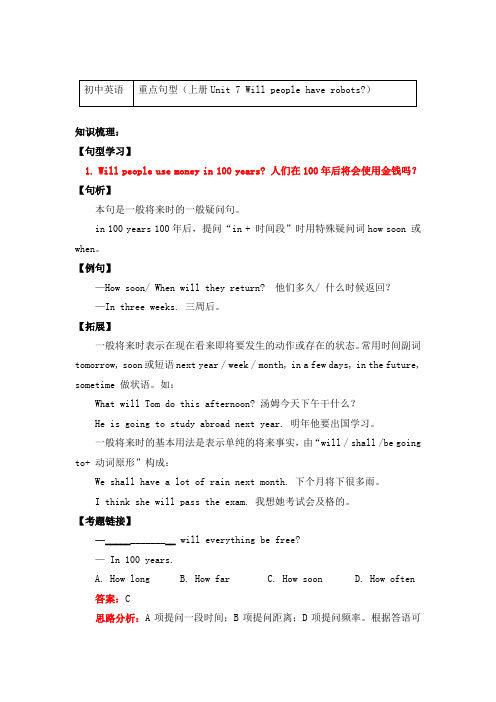
知识梳理:【句型学习】1. Will people use money in 100 years? 人们在100年后将会使用金钱吗?【句析】本句是一般将来时的一般疑问句。
in 100 years 100年后,提问“in + 时间段”时用特殊疑问词how soon 或when。
【例句】—How soon/ When will they return? 他们多久/ 什么时候返回?—In three weeks. 三周后。
【拓展】一般将来时表示在现在看来即将要发生的动作或存在的状态。
常用时间副词tomorrow, soon或短语next year / week / month, in a few days, in the future, sometime 做状语。
如:What will Tom do this afternoon? 汤姆今天下午干什么?He is going to study abroad next year. 明年他要出国学习。
一般将来时的基本用法是表示单纯的将来事实,由“will / shall /be going to+ 动词原形”构成:We shall have a lot of rain next month. 下个月将下很多雨。
I think she will pass the exam. 我想她考试会及格的。
【考题链接】—______________ will everything be free?—In 100 years.A. How longB. How farC. How soonD. How often答案:C思路分析:A项提问一段时间;B项提问距离;D项提问频率。
根据答语可知问句应用how soon提问。
句意为“多久后一切东西都免费?”。
2. There will be fewer people. 将有更少的人。
【句析】本句是含有there be句型的一般将来时的简单句。
新人教版八年级上册英语单元语法及知识点概述
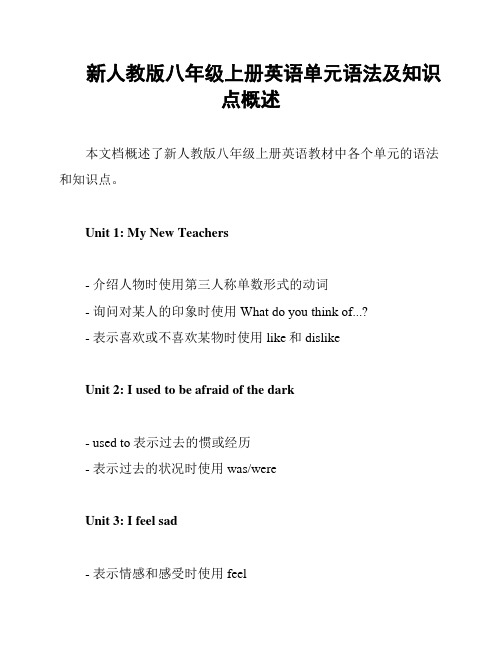
新人教版八年级上册英语单元语法及知识点概述本文档概述了新人教版八年级上册英语教材中各个单元的语法和知识点。
Unit 1: My New Teachers- 介绍人物时使用第三人称单数形式的动词- 询问对某人的印象时使用What do you think of...?- 表示喜欢或不喜欢某物时使用like和dislikeUnit 2: I used to be afraid of the dark- used to表示过去的惯或经历- 表示过去的状况时使用was/wereUnit 3: I feel sad- 表示情感和感受时使用feel- 使用be动词+形容词表达情感状态- 表示总是或经常做某事时使用always或often Unit 4: What's the best movie theater?- 比较级和最高级的用法- 询问建议时使用What do you suggest?- 表示原因时使用becauseUnit 5: It must belong to Carla- 表示推测或某事是肯定的时使用must- 表示推测或某事是可能的时使用might- 表示推测或某事是否定的时使用can'tUnit 6: I like music that I can dance to- 表示喜欢某种中性事物时使用like- 表示喜欢可以+动词原形的事物- 表示不喜欢不可以+动词原形的事物Unit 7: Teenagers should be allowed to choose their own clothes- 表示应该或不应该做某事时使用should or shouldn't- 表示能够或不允许做某事时使用can or can't- 使用be动词+动词不定式表示被允许或不被允许做某事Unit 8: Home alone- 表示需要或必需做某事时使用have to- 表示过去需要或必需做某事时使用had to- 表示建议或推荐时使用should或had betterUnit 9: When was it invented?- 使用一般过去时表示过去的经历或事件- 使用一般过去时的疑问句形式提问过去的经历或事件- 使用介词短语表示一段时间以上是新人教版八年级上册英语教材中各单元的语法和知识点概述。
人教版新目标八年级英语上册Unit 9讲义及重点总结
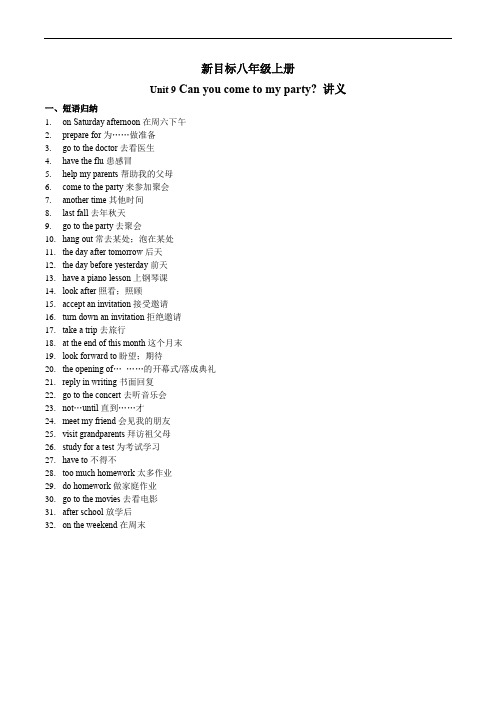
新目标八年级上册Unit 9 Can you come to my party? 讲义一、短语归纳1.on Saturday afternoon在周六下午2.prepare for为……做准备3.go to the doctor去看医生4.have the flu患感冒5.help my parents帮助我的父母e to the party来参加聚会7.another time其他时间st fall去年秋天9.go to the party去聚会10.hang out常去某处;泡在某处11.the day after tomorrow后天12.the day before yesterday前天13.have a piano lesson上钢琴课14.look after照看;照顾15.accept an invitation接受邀请16.turn down an invitation拒绝邀请17.take a trip去旅行18.at the end of this month这个月末19.look forward to盼望;期待20.the opening of………的开幕式/落成典礼21.reply in writing书面回复22.go to the concert去听音乐会23.not…until直到……才24.meet my friend会见我的朋友25.visit grandparents拜访祖父母26.study for a test为考试学习27.have to不得不28.too much homework太多作业29.do homework做家庭作业30.go to the movies去看电影31.after school放学后32.on the weekend在周末二、句型荟萃1. invite sb. to do sth. 邀请某人做某事2. what引导的感叹句结构:What+a/an+adj.+可数名词单数(+主语+谓语)!3. What+adj.+名词复数/不可数名词(+主语+谓语)!4. help sb.(to)do sth.帮助某人做某事5. be sad to do sth.做某事很悲伤6. see sb. do sth. see sb.doing sth.7. the best way to do sth.做某事最好的方式8. have a surprise party for sb.为某人举办一个惊喜派对9. look forward to doing sth.期盼做某事10. reply to sth./sb.答复某事/某人11. What’s today?今天是什么日子?What’s the date today? What day is it today?三、重难点知识讲解1. Can you come to my party on Saturday afternoon?in:用在上午下午晚上,在月份、季节和年之前;on用在星期、日期、节日和特定的某一天前。
英语八年级上册知识讲义 语法讲解(形容词和副词的比较级和最高级)-人教新目标版
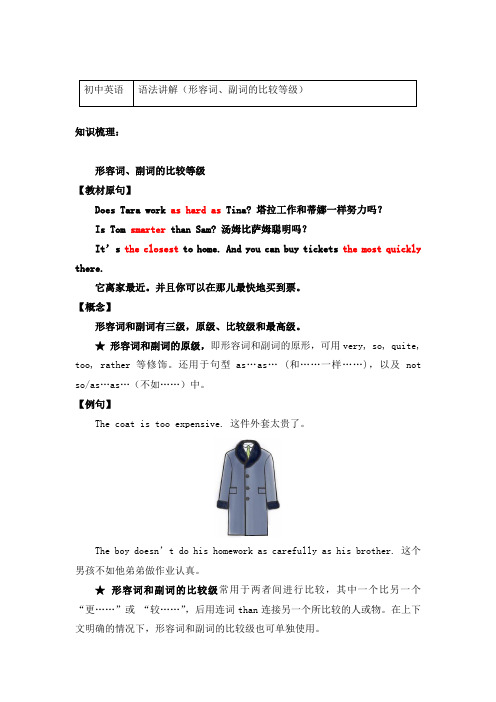
初中英语语法讲解(形容词、副词的比较等级)知识梳理:形容词、副词的比较等级【教材原句】Does Tara work as hard as Tina? 塔拉工作和蒂娜一样努力吗?Is Tom smarter than Sam? 汤姆比萨姆聪明吗?It’s the closest to home. And you can buy tickets the most quickly there.它离家最近。
并且你可以在那儿最快地买到票。
【概念】形容词和副词有三级,原级、比较级和最高级。
★形容词和副词的原级,即形容词和副词的原形,可用very, so, quite, too, rather等修饰。
还用于句型as…as… (和……一样……),以及 not so/as…as…(不如……)中。
【例句】The coat is too expensive. 这件外套太贵了。
The boy doesn’t do his homework as carefully as his brother. 这个男孩不如他弟弟做作业认真。
★形容词和副词的比较级常用于两者间进行比较,其中一个比另一个“更……”或“较……”,后用连词than连接另一个所比较的人或物。
在上下文明确的情况下,形容词和副词的比较级也可单独使用。
【例句】I’m more outgoing than my sister. 我比我姐姐外向。
I can’t hear you. Can you sing more loudly? 我听不到。
你能再大点声唱吗?★形容词和副词的最高级用于三者或三者以上间的比较,且形容词最高级前要加定冠词the。
(但是形容词最高级有物主代词、指示代词、名词所有格或专有名词修饰时,不用定冠词the。
) 副词最高级前的the可以省略。
最高级通常有一个比较范围,常用介词of, in引导。
【例句】He is the cleverest student of the three. 他是三个学生中最聪明的。
精选推荐017-2018年八年级英语上册 语法 完形填空讲义 (新版)人教新目标版

完形填空(讲义)完形填空解题技巧掌握完形填空解题技巧1. 解决完形三步走2. 实战演练Two brothers worked together on a farm. One was married and had a large 36 .The other had no wife yet. Although they lived in different houses, they shared everything they got from their farm.36.A. groupB. familyC. classD. team完形填空逻辑推理题解析掌握完形填空逻辑推理题解析1. 解题技巧2. 实战演练I was glad to be like my friends who all had mobile phones. Having one was very important, I actually didn’t use it much. A. andB. soC. sinceD.but完形填空语境题解析掌握完形填空语境题解析1.技巧提炼2.实战演炼My father told me Charlie, one of my , had a goodlibrary. A.brothers B. sistersC.aunts D. classmates………………………………Of course we were happy to meet each other again and talked a lot about our schoolmates and teachers.完形填空解题技巧演练掌握完形填空解题技巧1. 技巧提炼2. 真题解析A farmer had some little dogs to sell. As he was putting up anadvertisement on the fence of his yard, a 31 happened to pass by.A. boyB. dogC. farmerD. son“I want to 32 one of your dogs, sir.” A .sellB. seeC. buyD. feed【参考答案】完形填空解题技巧答案:36. B完形填空逻辑推理题解析答案:D完形填空语境题解析答案:D完形填空解题技巧演练答案:31.A 32.C。
20172018年八年级英语上册语法词语运用讲义人教新目标版
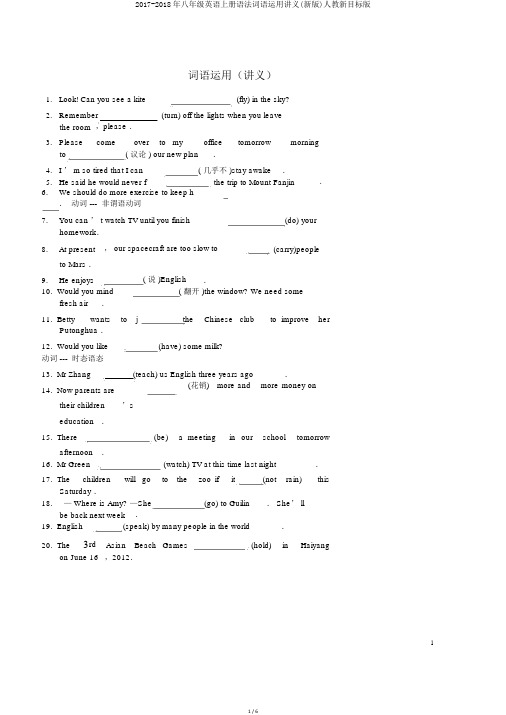
词语运用(讲义)1. Look! Can you see a kite (fly) in the sky?2. Remember (turn) off the lights when you leavethe room ,please .3. Please come over to my office tomorrow morningto ( 议论 ) our new plan .4. I ’ m so tired that I can ( 几乎不 )stay awake .5. He said he would never f the trip to Mount Fanjin .6.We should do more exercise to keep h.动词 --- 非谓语动词7. You can ’ t watch TV until you finish (do) yourhomework.8. At present , our spacecraft are too slow to (carry)peopleto Mars .9. He enjoys ( 说 )English .10. Would you mind ( 翻开 )the window? We need somefresh air .11. Betty wants to j the Chinese club to improve herPutonghua .12. Would you like (have) some milk?动词 --- 时态语态13. Mr Zhang (teach) us English three years ago .(花销) more and more money on14. Now parents aretheir children ’seducation .15. There (be) a meeting in our school tomorrowafternoon .16. Mr Green (watch) TV at this time last night .17. The children will go to the zoo if it (not rain) thisSaturday .18. — Where is Amy? —She (go) to Guilin . She’ llbe back next week .19. English (speak) by many people in the world .20. The 3rd Asian Beach Games (hold) in Haiyangon June 16 ,2012.1练习:21. There is no doubt that the Huangyan Island toChina .( belong )22. When he was young ,he (prefer) English to maths .23. The Women ’s World Cup (not begin) until1991 when China hosted it in Guangzhou .24. I was ( 写 ) a report when the doorbell rang .25. The living conditions in the countryside have _ ( 改良) a lot .26. The final result can (find) on our website by theend of this week .27. 两天前他就把那本小说( novel )读完了,此刻他正在学习德语呢。
【小初高学习]2017-2018年八年级英语上册 语法 连词讲义 (新版)人教新目标版
![【小初高学习]2017-2018年八年级英语上册 语法 连词讲义 (新版)人教新目标版](https://img.taocdn.com/s3/m/8ff0b1d7998fcc22bdd10d0a.png)
连词(讲义)并列连词的使用熟练掌握并运用写作中常用并列连词 1.顺承关系: and2.转折关系: but, yet, however, while 3.因果关系: so4.选择关系: or, either…or用适当的并列连词填空:1. I like fish,my brother doesn ’t like it.2. Hurry up, you won ’t catch the early bus.3. Go along the road, you ’ll find the market at the end of it.4. I ’m not hungry,I don ’t want to eat anything.从属连词的使用熟练掌握并运用写作中常用从属连词1.原因状语从句: because, for, since, as2.让步状语从句: though, although 3.条件状语从句: if4.时间状语从句: when1. I take exercise every day because it ’s a good way tokeep healthy. 2. Although we are busy studying on weekdays, we can take exercise on weekends.3. If we have any question, she will try her best to help us.4.When we were playing in the park, my mother called me.【参考答案】并列连词的使用1.but2.or3.and4.so。
(最新整理)2018新人教版八年级上册英语单元语法及知识点归纳

2018新人教版八年级上册英语单元语法及知识点归纳编辑整理:尊敬的读者朋友们:这里是精品文档编辑中心,本文档内容是由我和我的同事精心编辑整理后发布的,发布之前我们对文中内容进行仔细校对,但是难免会有疏漏的地方,但是任然希望(2018新人教版八年级上册英语单元语法及知识点归纳)的内容能够给您的工作和学习带来便利。
同时也真诚的希望收到您的建议和反馈,这将是我们进步的源泉,前进的动力。
本文可编辑可修改,如果觉得对您有帮助请收藏以便随时查阅,最后祝您生活愉快业绩进步,以下为2018新人教版八年级上册英语单元语法及知识点归纳的全部内容。
2018新人教版八年级上册英语单元语法及知识点归纳Unit1 Where did you go on vacation?【重点语法】不定代词:不指名代替任何特定名词或形容词的代词叫做不定代词。
用法注意:1。
some 和any +可数名/不可数名.some 多用于肯定句,any多用于否定句、疑问句和条件从句。
有些问句中用some,不用any,问话者希望得到对方肯定回答。
2. 由some, any, no, every 与 body, one, thing构成的复合不定代词作主语时,其谓语动词用三单。
3。
不定代词若有定语修饰,该定语要置于其后:如:something interesting【重点短语】1。
buy sth for ab。
/ buy sb. sth 为某人买某物2。
taste + adj. 尝起来……3。
nothing.。
.but + V.(原形)除了……之外什么都没有4. seem + (to be) + adj 看起来5. arrive in + 大地方 / arrive at + 小地方到达某地6. decide to do sth。
决定做某事7. try doing sth。
尝试做某事 / try to do sth。
尽力做某事8. enjoy doing sth。
八年级英语上册语法连词讲义(新版)人教新目标版
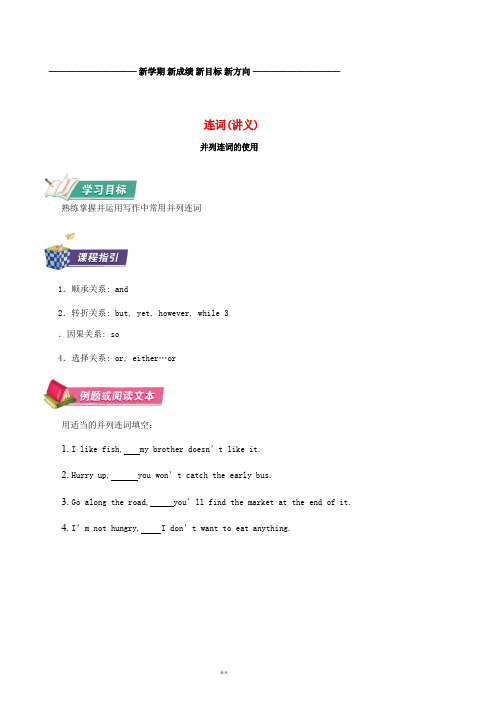
—————————— 新学期 新成绩 新目标 新方向 ——————————连词(讲义)并列连词的使用熟练掌握并运用写作中常用并列连词 1.顺承关系: and2.转折关系: but, yet, however, while 3.因果关系: so4.选择关系: or, either…or用适当的并列连词填空:1. I like fish, my brother doesn ’t like it.2. Hurry up, you won ’t catch the early bus.3. Go along the road, you ’ll find the market at the end of it.4. I ’m not hungry,I don ’t want to eat anything.从属连词的使用熟练掌握并运用写作中常用从属连词1.原因状语从句: because, for, since, as2.让步状语从句: though, although 3.条件状语从句: if4.时间状语从句: when1. I take exercise every day because it ’s a good way to keep healthy.2. Although we are busy studying on weekdays, we can take exercise on weekends.3. If we have any question, she will try her best to help us.4.When we were playing in the park, my mother called me.【参考答案】并列连词的使用1.but2.or3.and4.so5.。
【拔高教育】2017-2018年八年级英语上册 语法 非谓语动词讲义 (新版)人教新目标版
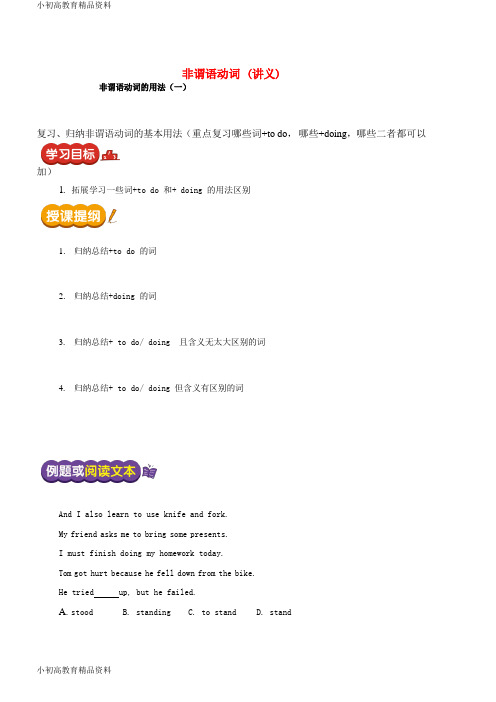
非谓语动词 (讲义)非谓语动词的用法(一)复习、归纳非谓语动词的基本用法(重点复习哪些词+to do , 哪些+doing ,哪些二者都可以加)1. 拓展学习一些词+to do 和+ doing 的用法区别1. 归纳总结+to do 的词2. 归纳总结+doing 的词3. 归纳总结+ to do/ doing 且含义无太大区别的词4. 归纳总结+ to do/ doing 但含义有区别的词And I also learn to use knife and fork.My friend asks me to bring some presents.I must finish doing my homework today.Tom got hurt because he fell down from the bike. He tried up, but he failed.A. stoodB. standingC. to standD. stand非谓语动词的用法(二)初步掌握不定式和动名词的用法和搭配一、不定式的用法1.作用2.句型3.搭配二、动名词的用法三、通吃搭配1.I find your teacher the truth.A.necessary to tellB.that necessary toC.it’s necessaryD.it necessary to tell2.I used to the cinema a lot, but now I don’t have that time.A.to goB. goC. to goingD. going【参考答案】非谓语动词的用法(一)答案:B非谓语动词的用法(二)答案:1. D 2. A。
2017-2018年八年级英语上册 语法 阅读理解讲义 (新版)人教新目标版
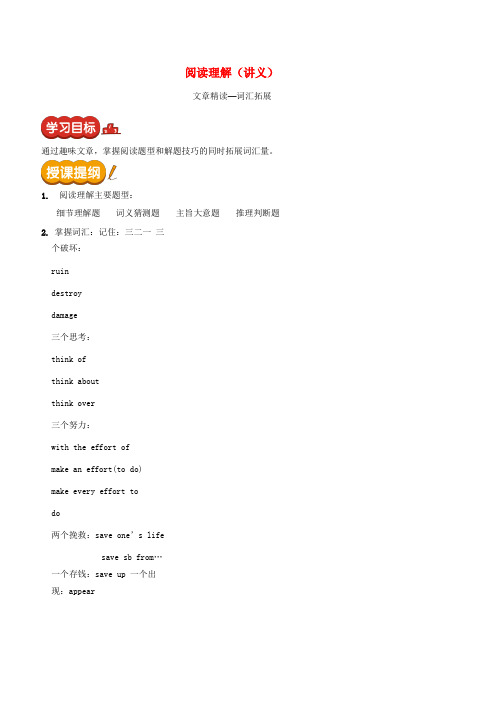
阅读理解(讲义)文章精读—词汇拓展通过趣味文章,掌握阅读题型和解题技巧的同时拓展词汇量。
1. 阅读理解主要题型:细节理解题词义猜测题主旨大意题推理判断题2. 掌握词汇:记住:三二一三个破坏:ruindestroydamage三个思考:think ofthink aboutthink over三个努力:with the effort ofmake an effort(to do)make every effort todo两个挽救:save one’s lifesave sb fr om…一个存钱:save up 一个出现:appearIn the year 3131, the goats live in the Qingqing Grasslands happily, while “Grey Wolf”and his wife “Red Wolf”move to Qingqing Grasslands to try and catch them.But goats in this time are very clever and powered with technology. Every time Grey Wolf appears at the School of Goats, he thinks of a secret plan to catch the goats. Among the goat students, a smart young boy goat named “Pleasan t” always finds a way toruin Grey Wolf’splans and save the goats. With the effort of Pleasant and his friends, Grey Wolf never catches any goats.The underlined word “r ui n” in the second paragraphprobably means .A. to breakB. to run away fromC. to changeD. to steal阅读理解主旨大意题和推理判断题技巧攻略掌握阅读理解技巧,重点掌握主旨大意题和推理判断题的解题技巧。
2017-2018年八年级英语上册 if引导的条件状语从句讲义 (新版)人教新目标版

if 引导的条件状语从句(讲义)状语用来表示行为发生的时间、地点、目的、方式、程度等,通常由副词或介词短语充当,也可由一个句子充当。
I slept at home yesterday because I had a bad cold.状语从句状语从句指句子作状语.根据其作用可分为时间、地点、原因、条件、目的、结果、让步、方式等从句.状语从句一般由连词(从属连词)引导.I will go to school by bike tomorrow if it is sunny。
Grammar focus-I think I’ll take the bus to the party.—If you do,you’ll be late。
If you take the bus to the party,you’ll be late.—I think I’ll stay at home.-If you do, you'll be sorry。
If you stay at home, you’ll besorry。
—What will happen if they have the party today?—If they have it today, half the class won’t come。
-Should we ask people to bring food?—If we ask people to bring food,they’ll just bringpotato chips and chocolate.1.if 在本单元句中意为“;”,用于引导.即 if 引导的是一个完整的句子,所以一定要有主谓,成为从句,另一个句子则成为主句。
If you go there,I’ll go, too.We will go hiking if it doesn’t rain tomorrow。
If Bob leaves tomorrow, I will hold a party for him tonight.2.if 引导的条件状语从句既可以放在主句前,也可放在主句后。
- 1、下载文档前请自行甄别文档内容的完整性,平台不提供额外的编辑、内容补充、找答案等附加服务。
- 2、"仅部分预览"的文档,不可在线预览部分如存在完整性等问题,可反馈申请退款(可完整预览的文档不适用该条件!)。
- 3、如文档侵犯您的权益,请联系客服反馈,我们会尽快为您处理(人工客服工作时间:9:00-18:30)。
连词(讲义)
并列连词的使用
熟练掌握并运用写作中常用并列连词
1.顺承关系: and
2.转折关系: but, yet, however, while 3
.因果关系: so
4.选择关系: or, either…or
用适当的并列连词填空:
1. I like fish, my brother doesn ’t like it.
2. Hurry up, you won ’t catch the early bus.
3. Go along the road, you ’ll find the market at the end of it.
4. I ’m not hungry, I don ’
t want to eat anything.
从属连词的使用
熟练掌握并运用写作中常用从属连词
1.原因状语从句: because, for, since, as
2.让步状语从句: though, although 3.
条件状语从句: if
4.时间状语从句: when
1. I take exercise every day because it ’s a good way to keep healthy.
2. Although we are busy studying on weekdays, we can take exercise on weekends.
3. If we have any question, she will try her best to help us.
4.
When we were playing in the park, my mother called me.
【参考答案】并列连词的使用
1.but
2.or
3.and
4.so。
